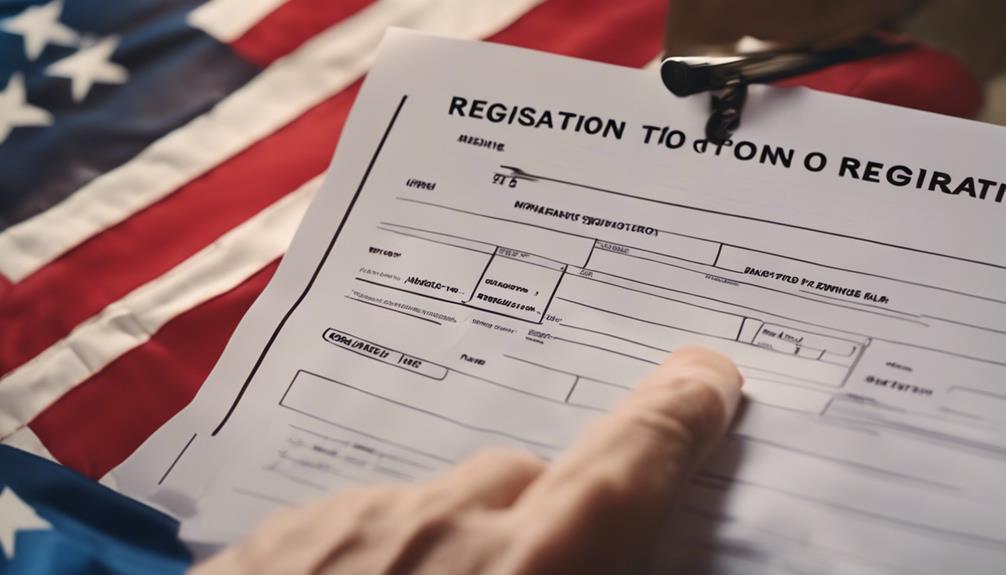As a non-resident entrepreneur eyeing the Texan market, you must be aware of crucial regulations governing your business endeavors in the Lone Star State. From registration protocols to tax liabilities, navigating the intricate legal landscape is paramount for your success.
Understanding these key regulations will not only ensure compliance but also pave the way for a smooth and prosperous business journey in Texas.
Key Takeaways
- Non-resident entrepreneurs must register to transact business in Texas.
- Accurate name registration and compliance are crucial to avoid fines.
- Timely tax registration and compliance prevent financial penalties.
- Understanding and adhering to licensing and legal procedures ensure operational legality.
Registration Requirements for Foreign Entities
To legally transact business in Texas as a foreign entity, you must adhere to specific registration requirements based on your entity type. Foreign entities operating in Texas are obligated to register if they're conducting business within the state. The registration process is essential for ensuring compliance with Texas laws and maintaining legal operation.
Failure to register can result in penalties for non-compliance with state regulations. It's crucial to understand that registration requirements differ depending on the type of entity, whether it be a foreign business trust or a non-U.S. business entity. Additionally, specific registration fees are applicable based on partner residency, emphasizing the importance of accurately completing the registration process.
Name Registrations and Penalties
When registering your business name as a non-resident entrepreneur in Texas, it's crucial to follow the specific guidelines set by the Secretary of State.
Failing to register your business name can lead to penalties and fines, highlighting the importance of compliance.
Ensure you complete the name registration process accurately to avoid any legal repercussions down the line.
Name Registration Process
Ensuring proper name registration is a critical requirement for non-resident entrepreneurs looking to operate legally in Texas and avoid potential penalties.
Registering your business name in Texas is a separate process necessary for legal operation. Failure to comply with state regulations regarding name registration can result in penalties.
The registration process grants you the authority to conduct business in Texas under the registered name. It's a crucial step to ensure legal compliance and avoid any potential repercussions.
Non-resident entrepreneurs must adhere to the specific name registration procedures to operate their businesses legally within the state. Make sure to follow all the necessary steps to register your business name correctly and securely establish your presence in the Texas market.
Penalty for Non-Compliance
Non-resident entrepreneurs in Texas must understand the potential penalties that can arise from failing to comply with business name registration requirements. Failure to register a business name can result in legal consequences, including fines. The penalties for non-compliance vary depending on the entity type. Adhering to name registration regulations is crucial for non-resident entrepreneurs to avoid these penalties. Understanding the process and ensuring timely registration can prevent costly legal consequences.
| Entity Type | Penalty | Legal Consequences |
|---|---|---|
| Sole Proprietorship | Monetary fine | Business name usage restrictions |
| Corporation | Suspension of operations | Lawsuits for unauthorized name usage |
| Limited Liability Company | Revocation of business license | Injunctions against using the unregistered name |
Business Transactions for Non-U.S. Entities

When considering business transactions for your non-U.S. entity in Texas, it's crucial to understand the tax implications that come with operating in the state.
Exploring different legal structure options can help you establish a framework that aligns with your business goals and complies with regulations.
Ensuring compliance with state and federal laws is essential to avoid penalties and maintain a legally sound operation.
Tax Implications for Foreign Entities
To operate legally in Texas as a non-U.S. entity, registering and complying with state and federal tax laws are essential steps.
Key Tax Implications for Foreign Entities:
- Ensure timely registration to avoid penalties and legal consequences.
- Comply with state and federal tax laws to maintain operational legality.
- Understand that failure to register can lead to financial penalties and hinder business activities.
Legal Structure Options
Considering the varying legal structures available, non-U.S. entities in Texas must carefully evaluate the personal liability and management implications associated with each option before registering their chosen structure. When selecting a legal structure for your entity, it is essential to understand the specific requirements and filing fees for each option. Below is a table outlining key information for different legal structures commonly chosen by non-U.S. entities in Texas:
| Legal Structure | Personal Liability | Management | Filing Fees |
|---|---|---|---|
| Sole Proprietorship | Unlimited | Owner | $XX |
| LLC | Limited | Flexible | $XX |
| Corporation | Limited | Board of Directors | $XX |
Ensuring compliance with Texas regulations is vital to facilitate smooth business transactions and operations within the state.
Compliance With Regulations
Evaluate the legal requirements and tax obligations to ensure compliance when conducting business transactions as a non-U.S. entity in Texas. Non-U.S. entities must register before transacting business in Texas to ensure legal operation within the state.
Compliance with state and federal tax laws is mandatory, with registration fees based on partner residency. Failure to register may result in penalties for non-U.S. entities conducting business in Texas.
Ensuring compliance with Texas regulations is essential to avoid legal repercussions and maintain a successful business operation. Stay informed about tax laws and registration processes to operate smoothly and securely in the Texan market.
Professional Associations and Licensing

Navigating professional associations and licensing requirements is essential for non-resident entrepreneurs looking to establish themselves in Texas. Professional associations, such as the Texas Association of Business, offer networking opportunities and resources that can be beneficial for non-resident entrepreneurs seeking to grow their ventures.
When it comes to licensing requirements, certain professions like healthcare or legal services mandate that non-resident entrepreneurs meet specific criteria to operate legally in Texas. This often involves obtaining professional licenses from Texas state boards.
Additionally, joining industry-specific associations can assist non-resident entrepreneurs in connecting with peers and staying compliant with professional standards. To ensure compliance and maintain legal status, non-resident entrepreneurs should thoroughly research and adhere to the licensing regulations outlined by Texas state boards.
Annual Reporting Obligations
When it comes to your annual reporting obligations as a non-resident entrepreneur in Texas, two critical points to focus on are the filing deadlines and required documentation. Understanding the specific deadlines for submitting your annual reports and the documentation needed to complete them accurately is essential for staying compliant.
Make sure to keep track of these key points to avoid penalties and ensure smooth operations for your business in Texas.
Filing Deadlines
To maintain compliance with Texas regulations, you must diligently adhere to specific filing deadlines for your annual reporting obligations. Missing these crucial deadlines can result in penalties and potential consequences for non-resident entrepreneurs. Here are three key points to consider regarding filing deadlines:
- Varied Deadlines: Deadlines for annual reports vary depending on your entity type, highlighting the importance of understanding your specific filing requirements.
- Staying in Good Standing: Meeting these deadlines is essential for staying in good standing with the state and avoiding any legal complications that may arise from non-compliance.
- Timely Submission: Ensure timely submission of the required forms and documentation to fulfill your annual reporting obligations and operate your business legally in Texas.
Required Documentation
As a non-resident entrepreneur in Texas, ensuring compliance with annual reporting obligations necessitates the meticulous preparation and submission of required documentation reflecting your entity's activities and financial status.
Texas reporting requirements mandate that entities like foreign LLCs, foreign corporations, and out-of-state businesses submit annual reports detailing information such as the entity's activities, financial status, and ownership structure. Failure to meet these obligations on time can lead to penalties or loss of good standing for your entity.
It's crucial for non-resident entrepreneurs to understand and fulfill their annual reporting obligations to maintain compliance with Texas regulations. Stay proactive in gathering and submitting the necessary documentation to ensure the smooth operation of your business within the state.
Assumed Name Usage for Foreign Entities

Utilize an assumed name, also known as a 'doing business as' (DBA) name, if your foreign entity is operating in Texas without its legal business name registered in the state. Registering an assumed name is crucial for non-resident entrepreneurs to ensure compliance with Texas regulations and avoid legal penalties.
Here are three key points to consider regarding assumed name usage for foreign entities:
- Compliance Requirement: Registering an assumed name is a legal requirement for foreign entities conducting business in Texas. It helps establish transparency and legitimacy in your operations within the state.
- Consumer Trust: Using an assumed name allows consumers to easily identify and engage with your foreign entity in Texas. This transparency fosters trust and credibility among your target audience.
- Avoid Penalties: Failure to register an assumed name can lead to legal consequences and penalties. By following the regulations and registering your DBA name, you can prevent any potential legal issues and operate smoothly in Texas.
Series LLC Registration in Texas
When establishing a Series LLC in Texas, you're creating a unique business structure where individual series operate autonomously with distinct legal protections. This innovative form of business organization allows for each series to function as a separate entity, providing liability protection by isolating the debts and obligations of one series from another.
Within a Series LLC, each series has the flexibility to engage in distinct business activities, maintain separate assets, and have different members or managers overseeing its operations. To set up a Series LLC in Texas, a specific provision in the certificate of formation is required to delineate the establishment of separate series, outlining the individual rights, powers, and duties of each series.
This type of business structure is particularly favored by real estate investors, asset managers, and business owners seeking to streamline operations and efficiently protect their assets while maintaining distinct divisions within the same legal entity.
Amendments to Registration

Are you aware of the crucial role amendments play in maintaining accurate and compliant business registration in Texas? Making changes to your registration is vital to ensure that your business information is up-to-date and in line with state requirements.
Here are three key points to consider regarding amendments in Texas:
- Stay Compliant: Filing the necessary amendments for changes in name, business activity, or entity type is crucial to staying compliant with state regulations.
- Avoid Penalties: Failure to file required amendments may lead to penalties or even the revocation of your registration, emphasizing the importance of timely updates.
- Ensure Accuracy: Keeping your registration information current through amendments helps in maintaining accurate records in the state database, reflecting the true status of your business entity.
Termination and Withdrawal Procedures
To properly conclude your business operations in Texas, it's essential to adhere to the specific termination and withdrawal procedures outlined by the state. When you decide to terminate your business in Texas, you must file the necessary documents according to state regulations. If your business is no longer conducting activities in Texas, it's crucial to withdraw your registration to avoid potential penalties. Specific forms are required for both the termination and withdrawal of registration, so ensure you complete them accurately.
Failure to comply with the termination or withdrawal procedures can result in the revocation of your registration. Revocation can occur due to various reasons as stipulated by state laws. However, if your registration is revoked, there are reinstatement procedures available for businesses looking to resume operations after revocation. Understanding and following the correct termination and withdrawal procedures, along with being aware of revocation and reinstatement processes, will help you navigate the regulatory requirements smoothly in Texas.
Revocation and Reinstatement Process

Considering the termination and withdrawal procedures discussed previously, understanding the revocation and reinstatement process is crucial for non-resident entrepreneurs in Texas. Non-compliance with state regulations can lead to revocation of registration, impacting your ability to conduct business in the state. To navigate this process effectively, you must follow specific procedures for reinstatement after registration revocation. This includes:
- Filing Necessary Documents: You'll need to submit all required paperwork promptly to begin the reinstatement process efficiently.
- Paying Fees: Ensure that all relevant fees are paid in full to complete the reinstatement process successfully.
- Adhering to Procedures: Following the outlined reinstatement procedures diligently is essential to regain your registration status and continue operating legally in Texas.
Compliance With State-Specific Regulations
Compliance with state-specific regulations in Texas is imperative for non-resident entrepreneurs conducting business activities within the state. Non-resident entrepreneurs must adhere to registration requirements to ensure compliance with Texas laws. The registration process varies depending on the type of entity, and failure to register can result in penalties for non-compliance.
Additionally, it's essential for non-resident entrepreneurs to understand and comply with both state and federal tax laws while operating in Texas. Being aware of registration fees based on partner residency is crucial for non-resident entrepreneurs looking to register their businesses in Texas.
Frequently Asked Questions
How Can a Foreigner Start a Business in Texas?
To start a business in Texas, as a foreigner, you must fulfill legal requirements, explore visa options, choose suitable business structures, seek funding sources, develop effective marketing strategies, consider cultural nuances, and leverage networking opportunities for success.
Can a Texas LLC Do Business in Another State?
When you take your Texas LLC across state lines, remember it's like stepping into a new arena. Ensure you meet LLC requirements, navigate the registration process, understand legal implications, and comply with state-specific regulations for seamless business expansion.
What Are the Tax Laws for Small Businesses in Texas?
For small businesses in Texas, tax laws cover various aspects like income tax, sales tax, deductions, and credits. Managing tax forms, expenses, and staying compliant with regulations are crucial. Be prepared for potential audits to ensure financial stability.
Does a Business Have to Be Registered in Texas?
You must register your business in Texas to operate legally. Failure to comply can result in penalties. Different entities have varying registration processes. Meeting these legal requirements is crucial for smooth business operations and tax compliance.
Conclusion
As you navigate the intricate web of regulations as a non-resident entrepreneur in Texas, imagine your business flourishing amidst the vibrant landscape of opportunity.
By diligently following registration requirements, reporting obligations, and compliance regulations, you're laying the foundation for success in the Lone Star State.
Stay focused on the details, stay professional in your approach, and watch your business thrive in the heart of Texas.